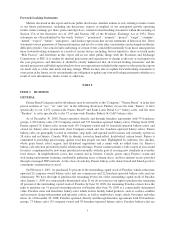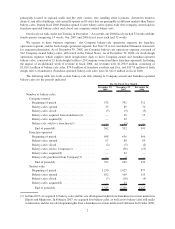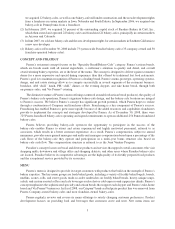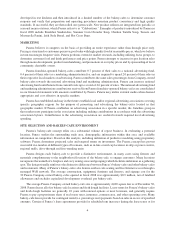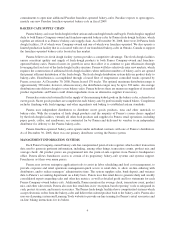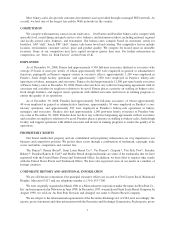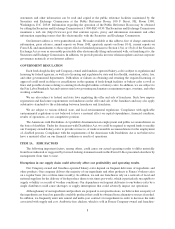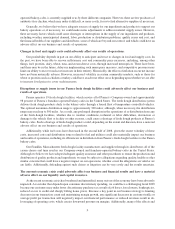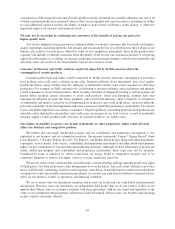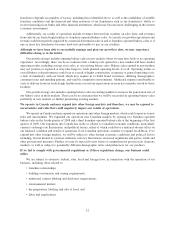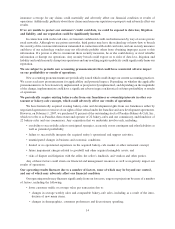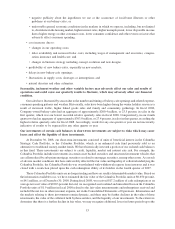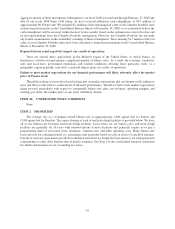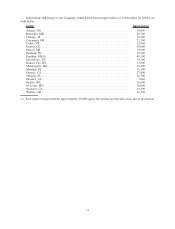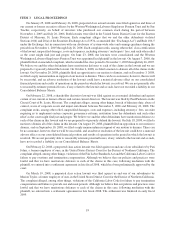Panera Bread 2008 Annual Report Download - page 18
Download and view the complete annual report
Please find page 18 of the 2008 Panera Bread annual report below. You can navigate through the pages in the report by either clicking on the pages listed below, or by using the keyword search tool below to find specific information within the annual report.Competition may adversely affect our operations and results of operations.
The restaurant industry is highly competitive with respect to location, customer service, price, quality of
products and overall customer experience. We compete with specialty food, casual dining and quick service
restaurant retailers including national, regional and locally owned restaurants. Many of our competitors or potential
competitors have substantially greater financial and other resources than we do, which may allow them to react to
changes in pricing, marketing and the casual dining restaurant industry better than we can. Additionally, other
companies may develop restaurants that operate with concepts similar to ours. We also compete with other
restaurant chains and other retail businesses for quality site locations and hourly employees. If we are unable to
successfully compete in our markets, we may be unable to sustain or increase our revenues and profitability.
Additionally, competition could cause us to modify or evolve our products, designs or strategies. If we do so,
we cannot guarantee that we will be successful in implementing the changes or that our profitability will not be
negatively impacted by them.
Loss of senior management or the inability to recruit and retain associates could adversely affect our
future success.
Our success depends on the services of our senior management and associates, all of whom are “at will”
employees. The loss of a member of senior management could have an adverse impact on our business or the
financial market’s perception of our ability to continue our growth.
Our success also depends on our continuing ability to hire, train, motivate and retain qualified associates in our
bakery-cafes, fresh dough facilities and support centers. Our failure to do so could result in higher associate turnover
and increased labor costs, and could compromise the quality of our service, all of which could adversely affect our
business.
Our ability to increase our revenue and operating profits could be adversely affected if we are unable to
execute our growth strategy or achieve sufficient returns on invested capital for bakery-cafe locations.
Our growth strategy consists of numerous aspects including new market development and further penetration
of existing markets, both by us and our franchisees, including the selection of sites which will achieve targeted
returns on invested capital. The success of this strategy depends on numerous factors that are not completely
controlled by us or involve risks that may impact the development, or timing of development, of our bakery-cafes.
Our ability to grow the number of bakery-cafes successfully will depend on a number of factors, including:
• identification and availability of suitable locations for new bakery-cafes on acceptable terms, including costs
and appropriate delivery distances from our fresh dough facilities;
• competition for restaurant sites;
• variations in the number and timing of bakery-cafe openings as compared to our construction schedule;
• management of the costs of construction of bakery-cafes, particularly factors outside our control, such as the
timing of delivery of a leased location by the landlord;
• our ability to take advantage of perceived opportunities in a softening commercial real estate market;
• securing required governmental approvals and permits and complying with applicable zoning, land use and
environmental regulations; and
• general economic conditions.
Our growth strategy depends on continued development by our franchisees. If our franchisees do not
continue to successfully finance and open new bakery-cafes, our business could be adversely affected.
Our growth strategy includes continued development of bakery-cafes through franchising. At December 30,
2008, approximately 58 percent of our bakery-cafes were operated by franchisees (763 franchise-operated
bakery-cafes out of a total of 1,325 bakery-cafes system-wide). The opening and success of bakery-cafes by
11


